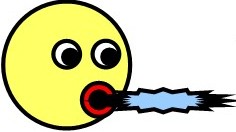I've been watching the Democrats' presidential primary campaigns with a certain sense of bemusement. The conventional wisdom was that Hillary Clinton was the Democrats' presumptive nominee, and that the amount of money that she had raised and her party connections, especially her husband, would be enough for her to steamroll the competition. And then, in Iowa, Hillary finished well behind Barack Obama and narrowly behind John Edwards for third place. The key to Obama's victory in Iowa was getting the youth vote out to vote for him.
Now, Obama is a charismatic politician and a fine orator, a comparatively youthful and handsome Senator with a photogenic young family. He shares at least that much in common with another man who ran for the presidency and won almost half a century ago: John F. Kennedy. Most importantly, he is significantly younger at 46 than his two main competitors' for the Democrat's nomination, Edwards (54) and Clinton (60), and his life experience falls on the other side of a significant divide.
Both Clinton and Edwards no doubt remember JFK and the assassination in November, 1963, a major traumatic event for those who were old enough to be aware of it at the time. They were shaped by the Vietnam War and the Watergate scandal, as well as the cynicism about America and its government. By contrast, Obama was too young to remember the Kennedy assassination, and by the time he came of age, the Vietnam War and conscription were history. The Watergate scandal was something that the adults were talking about, and those of us who were young teens at the time breathed in the cynicism like second-hand smoke, but it was not the main formative experience of our lives as it was for people a decade older than us. Instead, our formative events were the hard economic times under Jimmy Carter, as well as the embarrassment of having Americans held hostage in Iran, and the resurgence of American pride and power under Ronald Reagan when Carter was voted out.
While all three candidates are "baby boomers," those of us at the tail end of the boom had significantly different formative experiences in our lives, which have permanently affected our world view in a lot of cases. For a lot of leading-edge Boomers born in the late 1940s, every war that America gets involved in is Vietnam all over again, and every president that they disagree with is another Nixon. They cannot escape this prism through which they view the world and which distorts their vision of reality.
It may be shocking to Hillary Clinton to think about it, but she's not so young any more. The 14-year age gap between Obama and her is the difference between a perception of youthfulness and a perception of age. The younger voters in Iowa apparently noticed the difference, and felt more of an affinity for Obama than for Hillary.
There was an interesting article in The New Yorker by Ryan Lizza about Hillary's final campaign rally in Iowa, which was at a museum in front of the skeleton of a mammoth. The theme music in the background was classic rock from the 1970s and 1980s. Boomer music, the music of the middle-aged. Is Obama's campaign using music from Bachman-Turner Overdrive? The Clintons have long since stopped thinking about tomorrow, and perhaps Paul McCartney's "Yesterday" would be more appropriate theme music.
To put the youth vote into perspective, let's look at one person who will able to vote in November for the first time, my niece Rachel, who is almost exactly thirty years younger than me. Rachel was born in 1990. For her, the end of the Vietnam War is farther back in time than World War II was for me. The Berlin Wall came down before she was born; the Soviet Union went out of business before she turned two, so she has no memory of the Cold War. For her entire life, someone named Bush or Clinton has been the President of the United States. Is it any wonder that any youth voter who wants "change" won't associate Hillary Clinton with that word?
To be honest, I'm not sure why so many people seem to want "change," because historically, these are pretty good times, at least as far as the economy goes. Unemployment is low, inflation is low, and people who weren't taking foolish chances in the housing market during the bubble aren't doing badly. Those who think these are bad economic times probably have never seen a real recession, much less a depression. They don't remember the Jimmy Carter years when the term "misery index" was coined. Any "change" that comes about is not likely to be for the better.

